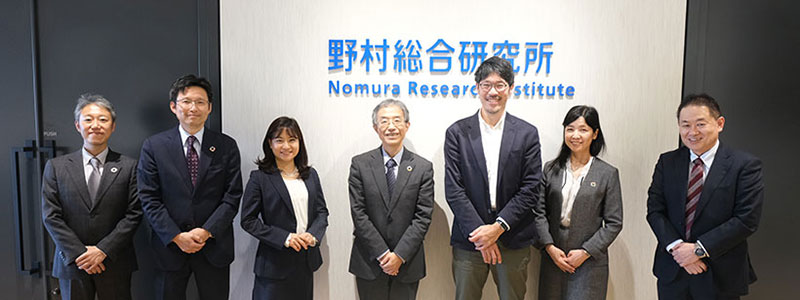
Since FY2010, Nomura Research Institute, Ltd. (NRI) has been carrying out annual dialogue with external experts as a way to understand global trends related to sustainability and reflect them in management strategies and risk management.
The tenth dialogue was carried out on November 19, 2021, and opinions were exchanged with three experts, primarily on “the way to position sustainability in medium-term management plans,” “promotion of diversity,” and “trends in ESG.”
Participants
(Affiliation and position as of November 2021)

Mr. Tsuyoshi Mizuguchi
Vice Chairman of Takasaki City University of Economics
After working at a trading company, auditing firm, and other establishments, became a lecturer in 1997 at the Takasaki City University of Economics, Faculty of Economics. Became a professor in 2008, assuming his current post in 2021.
Research areas include responsible investment (ESG investment) and the disclosure of non-financial information. Serves as the Chair of the Expert Panel on Sustainable Finance established by Japan Financial Services Agency, Chair of the Ministry of the Environment’s Advisory Committee on Green Finance, and Chair of the Japan Exchange Group, Inc.’s Sustainable Finance Platform Development Working Group, among others.

Ms. Emi Onozuka
Chief Operations Officer, Japan Catalyst, Inc (Monex Group)
Assumed current post in 2020 after working at JP Morgan Bank and Goldman Sachs Asset Management (GSAM). She was involved in a diverse range of asset management operations. From 2016, while at GSAM JAPAN, presided over the promotion of stewardship responsibilities and carried out ESG analysis as well as engagements with more than 200 companies each year.
She is presently involved in engagement strategies and concurrently serves as the Chair of the Steering Committee of the Japan Stewardship Initiative and as a member of Expert Panel on Sustainable Finance established by Japan Financial Services Agency.

Mr. Yasushi Hibi
Vice President, Asia Policy and Managing Director, CONSERVATION INTERNATIONAL-JAPAN
Assumed current post in April 2003 after working at NRI and the United Nations Development Programme (UNDP). Aims to build sustainable society through the conservation of biodiversity. Engaged in developing partnerships with international organizations, governments, companies, and others.
Is an expert in areas such as the environmental and social aspects of international cooperation, climate change and biodiversity, natural capital accounting, corporate sustainability, and the management of non-profit organizations. He has visited 71 countries. Completed the graduate program at Duke University’s Nicholas School of the Environment.

Takeshi Hihara
Senior Managing Director, NRI
In charge of corporate planning, business strategies, corporate communications, legal affairs and intellectual properties, information systems, and IR.
As the person in charge of promoting sustainability management, promotes business strategies to achieve the sustainable growth of NRI.

Kaga Yanagisawa
Senior Managing Director, NRI
In charge of human resources and human resources development, deputy in charge of corporate planning.
As a strategic consultant, has been working for about 25 years in various areas and themes, including the formulation of medium-term management plans, business strategies, M&A, organizational development, and reform of organizational climates.
Other participants from NRI
Yasuhiro Komatsu, General Manager, Corporate Communication Department
Kenji Honda, Manager, Sustainability & Responsibility Group
The Positioning of Sustainability in Corporate Strategies
How should companies position and systematize sustainability in regard to their management visions and medium-term management plans?
Mr. Mizuguchi:
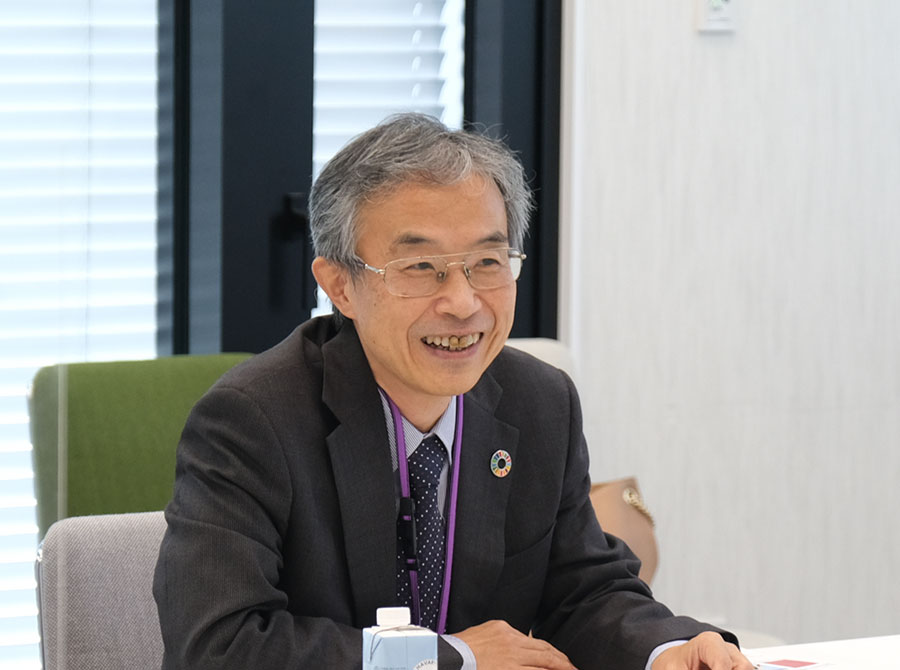
It is conceivable that sustainability will become the center of management strategies in the future. In that sense, I consider it to be corporate management itself. In other words, companies that cannot contribute to the achievement of sustainability cannot contribute to society. It is important to decrease the negative impacts [that a company may have] and increase those impacts that are positive in order to position sustainability as a corporate strategy.
If speaking about negative impacts, NRI possesses data centers. Therefore, it is essential that NRI deals with the decarbonization of its data centers. The use of renewable energy at major NRI data centers already seems to be progressing. Since NRI has already come this far, perhaps it is better to establish and call attention to targets that are more aggressive, such as to achieve net-zero carbon emissions by FY2025.
On the other hand, in regard to positive impacts, I got the impression that a key is that you will achieve the transformation of social paradigms. It will probably be better if, in the future you, disclose details regarding paradigm transformation, such as the kind of initiative that will be undertaken toward achievement and the department that will be handling it.
Additionally, because your company name is “Nomura Research Institute,” you will probably need to highlight your position as a research institute while contributing to society. For example, there are no opinion-leader type organizations like the World Economic Forum (WEF) and the World Resources Institute (WRI) in Japan. One of the ways to position sustainability at NRI is for the company to become an opinion leader in Japan and make recommendations on the direction that should be taken by society.
Ms. Onozuka:
The first expectation that investors have toward NRI is financial growth. Their expectation is that by enhancing ROE and through further global development, NRI’s sustainability scenario will be one that matches its financial growth strategy.
“Sustainability management” and “sustainable management” are two different things. Sustainability management is business management that focuses primarily on contributing to environmental and social sustainability. This is not what investors are expecting. How will NRI sustainably meet the demands of all stakeholders as a listed company? In other words, we would like to see NRI carry out sustainable management, which increases the company’s sustainability by boosting its financial results and decreasing risks through consideration given to the environment and society.
To enable this, there is a need for the company to communicate to each stakeholder what it sees as being issues, how it will provide value, and in what kind of time frame. The time frame concept is an element that is not often seen in the integrated reports, ESG-related disclosures, and other items published by Japanese companies. Therefore, we would like you to consider from the aspect of business, how sustainability will be positioned as a sustainable management strategy, including alignment with the stakeholder's time frame.
On the Promotion of Diversity
How should we undertake the promotion of women’s participation and advancement in the workplace?
Yanagisawa (NRI):
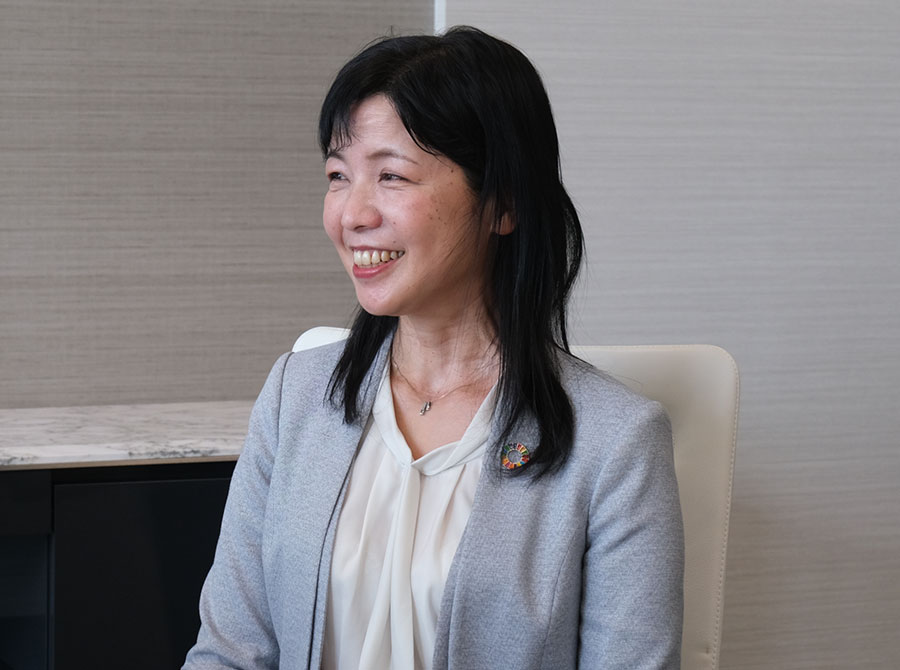
One of the items that the Act on the Promotion of Female Participation and Career Advancement in the Workplace made mandatory for disclosure is the “ratio of female managers.” Therefore, targets are being set and are disclosed externally. However, in regard to the targets being sought, the Keidanren, for example, has established as the target, raising the ratio of female managers to 30%. However, we feel that it is difficult to achieve this target on a short-term basis. We would like to implement measures from a long-term perspective to increase the ratio of female managers, including the recruitment and development of women toward the future appointment of women who will serve as core personnel.
An item related to securing in-house diversity, including female participation and advancement, was added to the Corporate Governance Code, which was revised this year. We are currently considering in-house how we will undertake this and disclose the results going forward.
Ms.Onozuka:
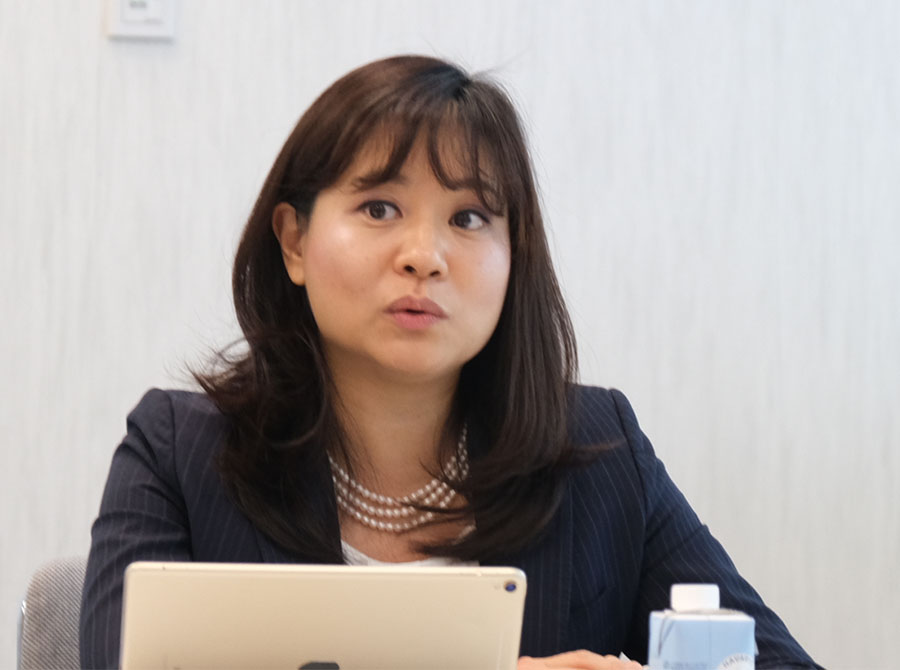
The participation and advancement of women is a major theme for Japan. There are expectations toward NRI, too, in the promotion of women’s participation and advancement in the workplace. However, we do understand that the ease or difficulty of promoting women’s participation and advancement can differ depending on the industry and type of work.
With that said, as far as investors are concerned, they would like to see companies with high aggregate market values like that of NRI undertake initiatives that will bring their ratio of female managers up to 30%. When engaging in dialogue with investors, it is more positive to talk about what kinds of initiatives are being undertaken to achieve the target and whether there are things that investors can do more of, rather than discuss why something is not being or cannot be done.
Mr. Hibi:
Human resources are NRI’s most important asset. I feel that a low ratio of female managers could mean that half of NRI’s overall human resources is being ignored. Would this not be a significant loss for NRI? To raise the ratio of female managers to a global level, there is probably a need to invest in in-house development of female employees.
What kind of disclosure should we make regarding the gender pay gap*?
Ms. Onozuka:
When recruiting personnel, there are some Japanese companies that hire people into either non-career positions or career positions. The desirable state would be one in which there are no disparities found when looking at gender pay gap data for personnel in career positions. If disparities are found, then thought should be given to what can be done to correct the situation.
Mr. Mizuguchi:
If personnel are divided into non-career and career positions, then further divided into age groups, then it is only natural that there would be no gender pay gap within the subdivision. Then why do disparities arise? It is not necessarily an indication that equal pay is not being made for equal work. It means that equal work is not being given. In other words, there is a difference in the ratio of men and women between non-career and career positions, and that is linked to the gender pay gap.
Today, disparities exist at any company. In fact, the gender pay gap has not been corrected even at companies abroad.
I see the disclosure of the gender pay gap for a company overall as the ideal. It is better to disclose averages according to management classifications and the overall average. This is because pursuing the reason for disparities will help in the understanding of where any unconscious biases are present.
-
*
Gender pay gap: Difference in the median income of women against the median income of men
How should the sustainability performance be linked to the compensations of members of the Board?
Ms. Onozuka:
In considering the linkage of the sustainability performance and the compensations of member of the Board, I felt that the case of an IT firm in Europe was the most useful reference. Its Board of Directors has committed to the promotion of sustainability, this has been integrated with the management strategy, and targets have been set. External disclosure has been made, and they have gone on record with an improvement idea toward the next fiscal year. At that company, the results of employee engagement are used when determining the compensation amounts of members of the Board.
Rather than simply making the adoption of specific ESG indicators an element for determining compensations, investors believe that it is better to link the compensations of members of the Board to indexes that are linked in real terms to corporate value, such as in the case of that company.
Mr. Mizuguchi:
Rather than simply linking compensations with sustainability indexes, it is because the scenario of the Board of Directors committing and integrating sustainability into the strategy is present that there is significance to linking sustainability to compensations at the end. Important points are not only the compensation but also what the Board of Directors commits to.
Mr. Hibi:
Since last year, the NGO organization that I belong to has also been linking sustainability performance with the compensation of Board members. Overseas, similar undertakings have already begun, not only at private enterprises but also at NGOs.
Trends Surrounding ESG
The Taskforce on Nature-related Financial Disclosures (TNFD) was launched, and the disclosure of nature-related information is starting to be sought. What kind of an impact will the increased importance of biodiversity have on companies?
Mr. Hibi:
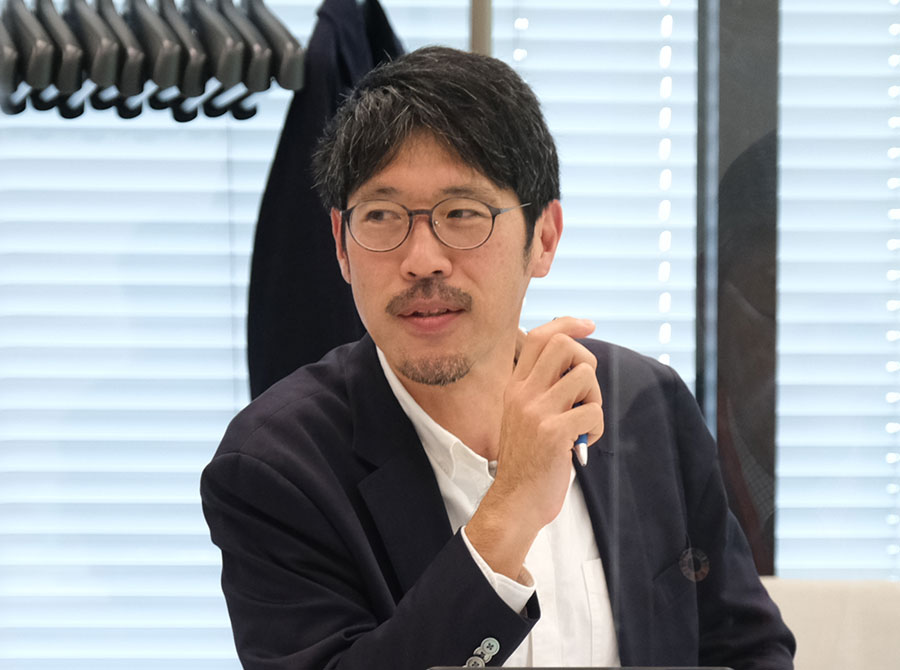
TNFD will have a large impact. The “N” in TNFD stands for “nature.” While nature may seem to have the same meaning as biodiversity, it is actually slightly different. In its academic definition, biodiversity refers to diversity at the level of genetics, species, and ecosystems. If looking only at this definition, businesses in Japan may tend to determine that biodiversity is something that does not concern them.
However, in Europe, the main thinking is that biodiversity is what makes nature as a whole, including climate and water resources, sustainable. This is because human society receives an extremely large amount of blessings from nature. All companies, without exception, receive the benefit of nature somewhere along its supply chain. The essence of TNFD efforts is how to make such nature as a whole sustainable.
In the case of climate change, how the climate is impacted and how the climate impacts us can be measured using greenhouse gas emissions as an indicator. However, it is difficult to find an indicator to measure the sustainability of nature, and this has been debated for a long time. Some indicator candidates that have appeared over the last several years include biodiversity and land-use area, amounts of water used, and the number of species as part of biodiversity. Carbon is also one of the indicators.
In Japan, many companies see biodiversity as part of the contribution it can make to society. However, forward-thinking companies overseas are beginning to consider matters while associating climate change with nature. For example, an IT firm in the U.S. launched the Restore Fund of about 20 billion yen, as part of investment activities toward reforestation. Furthermore, a global consumer goods manufacturer has made a large-scale investment toward nature. These companies are directly impacted in relation to raw materials, which is why they were swift to make such moves.
However, the investments are on such a large scale that they cannot be understood if looking at biodiversity as simply a part of the contribution made to society. Such investments will continue to progress in the future. Such overseas companies are influencing the creation of momentum toward the making of rules.
There are still many opportunities available, such as participating in rulemaking by the TNFD. An immediate raising of awareness among Japanese companies is important. It is also important to respond to the TCFD and contribute to efforts to mitigate climate change. This is because making a sound response to the TCFD means that response is also made to the TNFD.
Mr. Mizuguchi:
When making nature sustainable, response must be made to multiple elements, much in the same way that environmental NGOs have been doing so up to now individually. So, the use of a variety of indicators will probably be adopted. I think that industry type and business category and environmental issues will be the matrices under which discussions will move forward. In the case of NRI, the points when building data centers will probably be where it will be built, how it will be built and what kinds of materials will be used.
If you look at the TNFD from the aspect of business risk or opportunity, I think the opportunity element is stronger for NRI. The ways and areas in which businesses have an impact on nature differ according to the industry and business category - for example, antibiotic substances, forest resources, and aquatic resources, to name a few, in the case of agriculture and animal husbandry. A paradigm shift is indeed about to begin, so consulting will become necessary. There are expectations toward the research and support of think tanks and consulting firms on what needs to be done to protect nature.
When making investment decisions, what kind of perspectives do institutional investors take when evaluating a company’s ESG activities?
Ms. Onozuka:
I get the sense through exchanges with asset owners here in Japan and abroad, that in regard to expectations toward Japanese companies, many investors are looking at the kind of a growth scenario, in accord with sustainability, the companies have created in their management reform . Recently, there has been a global increase in ESG activists who take up causes related to the environment or society when there are problems with a company. I think that going forward, as sustainability becomes implemented as a part of management strategies, a company will be evaluated on the basis of the balance it is able to maintain between responding to the claims of activities and corporate performance.
We are trying to expand the adoption of renewable energy. How should we go about its procurement going forward?
Mr. Mizuguchi:
Since NRI is on the procurement side of such energy, you probably need a mechanism for fostering the suppliers of renewable energy at the same time. Various regions are trying to create procurement platforms for renewable energy.
However, there is a problem if a major corporation from Tokyo cuts down a regional forest to install solar panels. Renewable energy procurement needs to be discussed together with the resolution of regional issues. The energy produced in a region should be procured within the same region, and such revenues should be returned to the region.
Mr. Hibi:
In terms of enabling social value co-creation by NRI as well, the renewable energy procurement should be made with additionality*. In the U.S. and China, the price of renewable energy became cheaper than coal around five years ago. In other words, Japan is significantly behind other countries in terms of renewable energy. I think this is because demand was not developed alongside the supply of renewable energy. Even if NRI procures renewable energy with additionality, the amount consumed by NRI may not be large enough to have much of an impact on society. However, I do think that it would have a very large impact in terms of what it communicates externally. Japan may be behind in the world, but even so, you should be ahead of others within Japan.
-
*
Additionality:Having the Effect of Creating New Renewable Energy
How do students see companies through ESG?
Mr. Mizuguchi:
At Takasaki City University of Economics, there are those students who are interested in ESG, and students who do not know about ESG. I feel there is bipolarization. However, there are now classes on the SDGs at junior and senior high schools. Takasaki City University of Economics, too, offers special lectures on the SDGs. I think that student awareness regarding ESG will become even stronger in the next few years.
Students seem to be looking at companies from three aspects: corporate philosophy, how pleasant the working environment is, and financial performance. These days, students are extremely concerned about the quality of the work style. That is why they seem to avoid highly restrictive companies, such as those that require long working hours, or where employees must follow every single order.
Ms. Onozuka:
The growing attitude among students and youths in the U.S. is to not want to work for a company that is not undertaking sustainability effort.
Hihara(NRI):
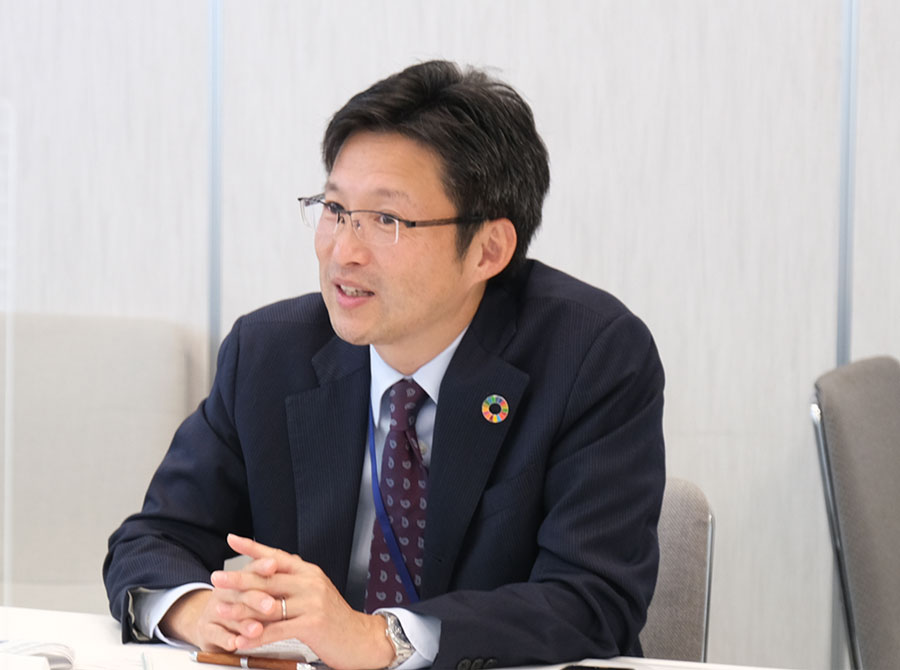
Thank you very much for your valuable opinions today. I feel anew that we need to solidly undertake the ESG so that we can meet the expectations placed on us toward the achievement of a sustainable society. We believe that there is much that we can contribute as a think tank for the transformation of social paradigms.
Because NRI is a B2B firm, we can only achieve a paradigm shift through our clients. We are advocating DX3.0 but we feel that it is extremely difficult to achieve. We will steadfastly accept the opinions we have received from you today and link them to our future actions with a sustainable mindset.
Thank you very much for your time today.
(Published in 14, 02. 2022)
- Materiality Topics
- Value Creation
- Value Creation Capital
- Management Basis (ESG)


